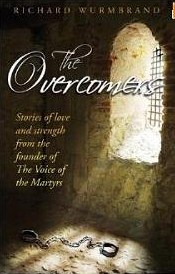Richard Wurmbrand
The Overcomers

One of the things that amazes me most about Richard Wurmbrand is how learned he is in spite of the years he suffered persecution, imprisonment and torture. The book is made up of 2 or 3 page stories of people who have suffered/been tortured for their faith in Christ the Lord, but every here and there are references to important personages of history, i.e. how Lenin and Freud became atheists, or how even Lenin might have accepted Christ in his deathbed; explanatory notes on subjects as varied as Science and Linguistics, i.e. the idea that Mark, the Evangelist, might be the rich man whom Jesus told to give everything to the poor and follow him, based on the word "eutheos", immediately (p.201).
The story about the Christian man was a mole in the Soviet secret police, Nikolai Khokhlov, who even wrote a book that now is out of print, is completely intriguing. Pity he didn't dwell more on some of these issues. Another little chapter that I will always treasure was the Parable of the Three Trees. A wonderful little story to tell to children (p.101).
The mention of the fact that in Aramaic there is no word to say "to have" (so jesus never pronounced this word) is quite intriguing too. (p.100); or that there are 40 ways to say No in Japanese.
But definitely, the lesson to learn from this one is that though not everybody is made of the stuff to withstand torture or be a hero of the faith, every one has a part to play, even though not in a very orthodox way: like the Christian preacher who praised -as he was told to do- the Rumanian dictator Ceausescu with his speech, while gesturing the opposite with his body language. Was his real meaning understood? Yes. Then he was not failing God. He was serving, astutely, Him, his own way (p.93). The author was imprisoned in Romania many years under the Soviet regime for his faith.
